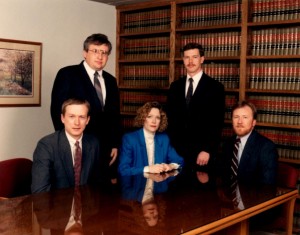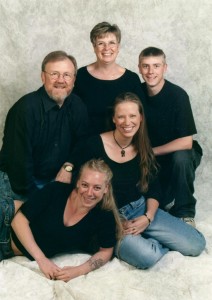I was named Robert after my father, but we had different middle names, so I was technically not a junior although many erroneously called me Bob Jr. My middle name, William, was in honor of Great-Grandfather Wilhelm, an immigrant from Sweden in the 1880’s. 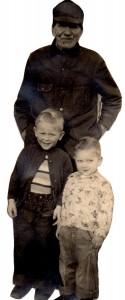 Wilhelm was one of the pioneers of Upsala, Minnesota, and also part of the small group of Swedes that founded Gethsemane Lutheran Church in that central Minnesota community.
Wilhelm was one of the pioneers of Upsala, Minnesota, and also part of the small group of Swedes that founded Gethsemane Lutheran Church in that central Minnesota community.
All his children were baptized in that church, including Grandma Hilma who returned to Upsala to raise her six daughters after the tragic death of her husband, Olaf Lofquist. Wilhelm became the surrogate father for my mom and her five sisters when their dad was killed in a car-train collision in 1936 when mom was six. Mom and my aunts thus returned to the same community and church founded by their Swedish grandparents two generations earlier.
Three miles west of Upsala, another husband and wife pair of Swedish immigrants had also settled in the latter years of the nineteenth century, but the family of Great-Grandfather Alfrid Holmen preferred the Swedish Covenant Church in Upsala. Julius, the youngest of Alfrid’s children, bought land next to the home place after he married Olga from the small enclave of Danish settlers who homesteaded just down the lane and who had attended the same one-room schoolhouse. Grandpa Julius and Grandma Olga eked out a meager existence on their rocky farm and raised their family in the hard times of the depression and WWII.
My father Robert, the fifth of their seven children, entered the Navy in 1944 after he graduated from Upsala High School, and he finished the war on a Destroyer in Tokyo Bay as the Japanese signed surrender documents. Following discharge, he waited in line to enroll at the University of Minnesota in Minneapolis, but a spur of the moment decision that he had his fill of “hurry up and wait” led to a hasty return to the family farm, which he would buy from his parents a few years later, but not before marrying my mother, Marilyn (Marlee) Lofquist, fresh from her valedictory speech at Upsala High School.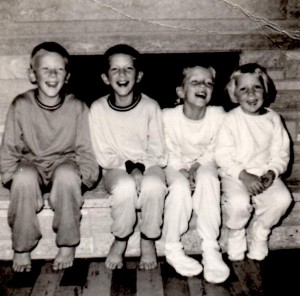
I came along soon after and spent a few years on that hardscrabble farm west of Upsala before the growing family (Mike, Becky, and Susan joined the family in two year intervals after me) moved into Upsala when Dad bought out the local fuel oil and gasoline business. We became town kids, and we were all baptized and confirmed as Lutherans at Gethsemane.
When I was a youngster growing up in Upsala, I was “Bobby”, but there were a few old timers around who still called my dad by that name. For awhile, we were “Little Bob” and “Big Bob”.
When I was sixteen and a high school junior, I dribbled the basketball at the free throw line at 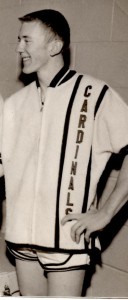 a home game while the cheerleaders shouted a familiar ditty: “See that basket, see that rim, come on Bobby, roll it in!”, but they changed the words at the urging of one of my buddies, and instead of “Bobby” they called me “Obie”. We didn’t have many TV choices in those days so everyone had seen the same humorous, one-time character who appeared on the old Bonanza TV western the previous Sunday night. Obie, a decrepit old miner, and his bloodhound had teamed up with the Dan Blocker character, the Cartwright brother named “Hoss”, to fight off the bad guys who wanted to steal the gold mine. I have no clue why my buddy thought it would be funny for the cheerleaders to call me “Obie”, but it was, and I cracked up at the free throw line while a murmur rippled through the crowd.
a home game while the cheerleaders shouted a familiar ditty: “See that basket, see that rim, come on Bobby, roll it in!”, but they changed the words at the urging of one of my buddies, and instead of “Bobby” they called me “Obie”. We didn’t have many TV choices in those days so everyone had seen the same humorous, one-time character who appeared on the old Bonanza TV western the previous Sunday night. Obie, a decrepit old miner, and his bloodhound had teamed up with the Dan Blocker character, the Cartwright brother named “Hoss”, to fight off the bad guys who wanted to steal the gold mine. I have no clue why my buddy thought it would be funny for the cheerleaders to call me “Obie”, but it was, and I cracked up at the free throw line while a murmur rippled through the crowd.
That was where the nickname got its start, but a few years later when I was a sophomore at Dartmouth College, it became useful when four out of thirteen men living on a wing of the French Hall dormitory were named “Bob”. We all assumed nicknames: “Anthro Bob” (an anthropology major), “Nork” (an abbreviated form of New York for the brash freshman from Queens), “Bobo” (the monkey), and “Obie” became my personal label.
Not that “Bob” or other usages died out. I ended my military service as “Sergeant Holmen”, and when I hung that title on my dorm door upon my return to Dartmouth in 1971, my new dorm mates worried that I was a “narc” (I definitely was not). During the three years of law school at the University back in Minnesota, I was often “Mr. Holmen”, and that was true also during twenty-five years in the private practice of law in St. Cloud.
After Dartmouth and the army, I returned to Minnesota. After three years in the Twin Cities and the U of M Law School, I returned to central Minnesota, cut my teeth as a young associate of a civil litigation law firm, then started my own firm and became senior partner of a leading trial practice firm in St. Cloud.
In the early ’80’s, I became a commuter when my wife Lynn and I built a lake home near Upsala to raise our three kids in their ancestral school, community, and church. Along the way, I had more or less become “Obie” to family and friends. Especially back in Upsala, “Obie” became a convenient distinction from my Dad, who remained the patriarch of the family.
The red beard has grayed, and the natty suit and crisp haircut have been replaced with a turtleneck and a pony-tail.
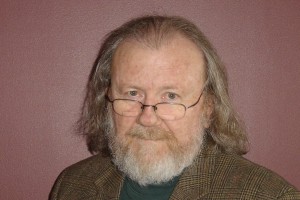
Mr. Holmen has retired and exchanged the courtroom for a book signing.
Call me Obie.
Curriculum Vitae
- BA (History) Dartmouth College 1972
- JD University of Minnesota 1975
- Civil Trial Attorney
- Graduate studies in theology and church history St John’s Abbey and University 1991-93
- Delegate to ELCA Synod Assemblies & Churchwide Assembly
- Member ReconcilingWorks (LGBT advocacy group)
- Frequent public speaker, workshop presenter,
retreat leader, instructor (LGBT issues, Pauline history, early church history, writer’s workshops); venues include congregations, church conventions, retreat centers, libraries, clergy associations, elder collegium - Biblical scholar and exegete
- Author, Spirit of a Liberal, a Christian Century blog, 2009-present
- Author, A Wretched Man, a novel of Paul the apostle, released in 2010
- Author, Prowl, Serialized short stories of Vietnam released in 2011
- Author, Queer Clergy: A History of Gay and Lesbian Ministry in American Protestantism, released in 2013.
